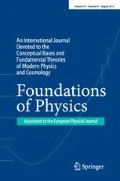Abstract
The proof of Bell's inequality is based on the assumption that distant observers can freely and independently choose their experiments. As Bell's inequality isexperimentally violated, it appears that distant physical systems may behave as a single, nonlocal, indivisible entity. This apparent contradiction is resolved. It is shown that the “free will” assumption is, under usual circumstances, an excellent approximation.
I have set before you life and death, blessing and cursing: therefore choose life....
—Deuteronomy XXX, 19
Similar content being viewed by others
References
J. S. Bell,Physics 1, 195 (1964).
A. Peres and W. H. Zurek,Am. J. Phys. 50, 807 (1982).
A. Peres,Found. Phys. 14, 1131 (1984).
G. Iooss, R. H. G. Helleman, and R. Stora, eds.,Chaotic Behavior of Deterministic Systems (North-Holland, Amsterdam, 1983).
A. Landé,Foundations of Quantum Theory (Yale University Press, New Haven, 1955), p. 4.
W. Perrie, A. J. Duncan, H. J. Beyer, and H. Kleinpoppen,Phys. Rev. Lett. 54, 1790 (1985).
F. James,Rep. Prog. Phys. 43, 1145 (1980).
A. Einstein, B. Podolsky, and N. Rosen,Phys. Rev. 47, 777 (1935).
N. Bohr,Phys. Rev. 48, 696 (1935).
A. Aspect, J. Dalibard, and G. Roger,Phys. Rev. Lett. 49, 1804 (1982).
J. S. Bell,J. Phys. C 2, 41 (1980).
A. Peres,Am. J. Phys. 46, 745 (1978).
A. Peres,Am. J. Phys. 52, 644 (1984).
R. L. Pfleegor and L. Mandel,Phys. Rev. 159, 1084 (1967).
S. J. Feingold and A. Peres,J. Phys. A 13, 3187 (1980).
N. Cufaro-Petroni, A. Garuccio, F. Selleri, and J. P. Vigier,C. R. Acad. Sci. Paris B 290, 11 (1980).
N. Herbert,Found. Phys. 12, 1171 (1982).
G. C. Ghirardi, A. Rimini, and T. Weber,Lett. Nuovo Cimento 27, 293 (1980).
D. N. Page,Phys. Lett. A 91, 57 (1982).
A. Shimony, inProc. International Symposium on Foundations of Quantum Mechanics (Phys. Soc. Japan, Tokyo, 1984).
A. Peres, “When is a quantum measurement?”,Am. J. Phys. 54 (1986), in press.
D. Finkelstein, inParadigms and Paradoxes, R. C. Colodny, ed. (Univ. Pittsburgh Press, 1971), Vol. V; reprinted inLogico-Algebraic Approach to Quantum Mechanics, C. A. Hooker, ed. (Reidel, Dordrecht, 1975), Vol. II, pp. 141–160.
H. Paul,Am. J. Phys. 53, 318 (1985).
A. Peres,Am. J. Phys. 43, 1015 (1975).
A. Peres and L. S. Schulman,Int. J. Theor. Phys. 6, 377 (1972).
L. Gatlin,Int. J. Theor. Phys. 19, 25 (1980).
J. A. Wheeler and R. P. Feynamn,Rev. Mod. Phys. 21, 425 (1949).
Author information
Authors and Affiliations
Additional information
Dedicated to Prof. John A. Wheeler on the occasion of his 75th birthday.
Rights and permissions
About this article
Cite this article
Peres, A. Existence of “free will” as a problem of physics. Found Phys 16, 573–584 (1986). https://doi.org/10.1007/BF01886522
Received:
Issue Date:
DOI: https://doi.org/10.1007/BF01886522



